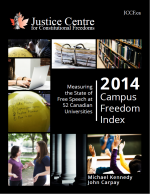 OTTAWA: The Justice Centre for Constitutional Freedoms (JCCF.ca) today released the 2014 Campus Freedom Index, a report measuring the state of free speech at 52 Canadian public universities.
OTTAWA: The Justice Centre for Constitutional Freedoms (JCCF.ca) today released the 2014 Campus Freedom Index, a report measuring the state of free speech at 52 Canadian public universities.
Using a five-tier letter scale—A, B, C, D and F—the Campus Freedom Index grades universities and student unions on their stated policies (what they say) and their practices (what they do). Each university receives four letter grades for each of university policies, university practices, student union policies, and student union practices.
With 208 grades awarded to 52 campuses, Canada’s universities and student unions in 2014 have received only five ‘A’ grades. Conversely ‘F’ grades were earned 33 times: 14 times by universities, and 19 times by student unions. In total, there are 24 campuses that earned at least one ‘F’, assigned to the university or to its student union.
In total, 24 campuses earned at least one ‘F’. Put another way, this means that almost half of the 52 universities studied have engaged in the censorship of student expression on campus, and have thus failed in their duty to protect free expression rights.
Based on the grades, the ten worst universities for upholding free expression are:
• Cape Breton University
• Lakehead University
• McGill University
• Mount Allison University
• Saint Mary’s University
• University of Ottawa
• University of the Fraser Valley
• University of Waterloo
• Vancouver Island University
• York University
The ten worst student unions for upholding free expression are:
• Dalhousie Student Union (DSU)
• Lakehead University Students’ Union
• Students Society of McGill University (SSMU)
• Memorial University of Newfoundland Students’ Union (MUNSU)
• Ryerson Student Union (RSU)
• Saint Mary’s University Student Association (SMUSA)
• Trent Central Student Association
• University of Calgary Students’ Union
• University of Manitoba Student Union (UMSU)
• York Federation of Students (YFS)
Ryerson University, Simon Fraser University, St. Thomas University, University of King’s College, and the University of Lethbridge all tied as the best universities in the country for upholding the free exchange of ideas.
When it comes to the policies and practices of student unions, the five best in Canada are the Acadia University Students’ Union (ASU), Brock University Students’ Union (BUSU), Carleton University Students Association (CUSA), Northern Undergraduate Students Society (NUGSS) and the University of Saskatchewan Students’ Union (USSU).
The 2014 Campus Freedom Index provides new insight into the amount of taxpayer dollars that are spent by our public universities through government transfers. The Index reports that the 24 campuses earning at least one ‘F’ grade receive more than $6.5 billion annually from our governments, in part so they can live up to their own missions of fostering the free exchange of ideas and academic freedom on campus. The Campus Freedom Index shows that these universities are failing in that mission, and taxpayers should hold them to account. Taxpayers foot the bill when administrators employ university resources to shut down student speech or engage in lengthy court action, such as Carleton University, the University of Calgary and Mount Royal University.
The Justice Centre looks forward to the day when every university, and every student union, earns only A’s for their policies and practices.
Negative developments during the 2013-14 school year
University of Regina – from A to F
The University of Regina, which had earned an ‘A’ grade in 2012-13 for having defended free speech in the face of public pressure, has now earned a ‘F’ in 2014 for actively censoring expression on campus. On Monday, April 14, 2014, at the University of Regina’s request, two peaceful protesters were arrested, hand-cuffed, and removed from campus for peacefully holding up signs and handing out flyers, expressing highly unpopular views.
University of Toronto – from D to F
The University of Toronto moves from a ‘D’ to an ‘F’ for its recent practice of charging security fees to a student group based on the content and unpopularity of the group’s beliefs and opinions. Through security fees, the University has effectively punished a “men’s issues awareness” group and rewarded the illegal behaviour of its opponents, who engage in physical obstruction and interruption of events. While the club and its members have not engaged in any wrongdoing, the University forces them to pay the cost of dealing with behaviour that is contrary to the Criminal Code of Canada and also expressly contrary to the University’s own policies, which prohibit disruption of events.
Dalhousie Student Union – from D to F
The Dalhousie Student Union (DSU) slides to an ‘F’ because of its recent endorsement of the Divest Dal movement, which aims to see Dalhousie University end its investments in fossil fuels. In addition to this new venture into the realm of taking a political stance, the DSU also has policies requiring clubs to adhere to its mission and vision statements, and imposes restrictions on candidates and students campaigning during elections and referenda.
Brandon University Students Union – from D to F
While the Brandon University Students Union (BUSU) moved from an ‘F’ to a ‘B’ in respect of its practices (see above), its grade for policies moved from ‘D’ to ‘F’ because BUSU repealed an anti-disruption policy which had previously provided at least notional support for free expression.
Positive developments during the 2013-14 school year.
Acadia Students’ Union – from C to A
The Acadia Students Union (ASU) earned an ‘A’ for practices, in contrast to a ‘C’ last year, for its defence of its student newspaper, the Athaenium. When the paper’s printing contractor refused to print its female sexuality issue due to the depiction sketch of a semi-nude woman on the cover, the ASU worked actively with both parties to reach a compromise, including proposing to pay for an opaque cover to block the ‘graphic’ image.
Brandon University Students’ Union – from F to B
In 2012 (informally) and in 2013 (officially), the Brandon University Students’ Union (BUSU) denied club status to the Brandon University Students for Life (“BUSL”). BUSU stated that “council felt a pro-life club would be ‘redundant’ since the Women’s Collective deals with all gender issues.” The JCCF sent a legal warning letter to BUSU on April 30, 2013, explaining how and why BUSL was legally entitled to form a campus club, on par with all other campus clubs. BUSU’s refusal to provide club status to these students resulted in the union receiving an ‘F’ in the 2013 Campus Freedom Index. However, BUSU changed its mind in September 2013, and granted club status to BUSL. While BUSU’s reversal on this issue came about only after legal and public pressure, the student union earns a ‘B’ grade in 2013-14 for doing the right thing.
Brock University Students’ Union – from D to B
The Brock University Students Union (BUSU) defended the right of pro-life students to hold a lecture that was disrupted by protesters on October 4, 2013. Following the incident, BUSU released a statement supporting the actions of Brock University and security, stating that “BUSU is an organization representing over 17,000 undergraduate students whom have varying opinions, ideologies, religious, political and social views. BUSU’s mandate is not to voice an organizational opinion on such topics. It is BUSU’s mandate to ensure that students are able to voice their views, thoughts and beliefs in a respectful, organized and safe manner.” BUSU’s actions demonstrate its commitment to upholding the free exchange of ideas on campus, and earn BUSU a ‘B’ grade in this year’s report, up from the ‘D’ grade received in 2013.
Queen’s University – Student Union – from F to C
Student councillors at Queen’s University’s Alma Mater Society (AMS), which last year received an ‘F’ for its practices of censoring student group displays, voted in March of 2014 to respect the right of its members to have equal access to AMS services regardless of their political views. This occurred after a Queen’s student and AMS member-at-large representing the un- registered student group “Opposition to the Misrepresentation of Men’s Issues and Feminism at Queen’s University” emailed members of AMS assembly to inform them that the group would be proposing a motion to de-ratify the Men’s Issues Awareness Society “because of the manner in which its members have chosen to publicly undermine feminism and anti-rape culture discourse on campus”. The motion failed. This recent demonstration of support for free expression gives the authors cautious reason to believe the AMS will continue to stand up for speech. The AMS therefore earns a ‘C’ in the 2014 Campus Freedom Index for its practices.
University of Calgary – from F to C
The University of Calgary earned an ‘F’ in the 2013 Campus Freedom Index for having charged seven of its students with “non-academic misconduct” for defying the University of Calgary’s demand that they set up their pro-life display with signs facing inwards so that no passers-by would be able to see the signs. With legal representation provided by the JCCF, the students commenced an action in the Alberta Court of Queen’s Bench to overturn the decision of the University’s Board of Governors, which had found the students guilty of non-academic misconduct. The Court released its judgment in Wilson et al. v. University of Calgary on April 1, 2014, ruling that the decision of the Board of Governors was unreasonable. In response to this Court ruling, the Student Discipline Appeal Committee of the Board of Governors of the University of Calgary allowed the appeal of the students who had been found guilty, and removed the charges from the students’ files. It remains unclear whether the U of C will continue with its past practice of singling out the campus pro-life club with a demand to pay security fees for sponsoring debates, setting up stationary displays, and other peaceful expression of opinion on campus.
University of Victoria Students’ Society – from F to D
In 2012-2013, the University of Victoria Students’ Society (UVSS) banned the Catholic Students’ Association (CSA) from distributing leaflets during Clubs Days, entitled “Pure Manhood,” “Pure Womanhood” and “Pure Love.” UVSS also mandated that the group write a letter of apology to the student body, and attend training regarding “oppressive language”. These actions came in addition to the UVSS denying club privileges and use of campus space to the campus pro-life club Youth Protecting Youth (YPY). Long-standing censorship efforts directed at YPY have earned UVSS an ‘F’ grade for several years. The UVSS also continues single out Greek Letter Organizations for restrictions. However, during the 2013-14 school year the UVSS rescinded its ban on the CSA, thereby earning a ‘D’ rather than another ‘F.’
The 2014 Campus Freedom Index: Worst Cases in 2013-14
• On April 14, 2014, the University of Regina requested that two individuals be arrested, hand-cuffed, and removed from campus for peacefully expressing unpopular views, such as “sodomy is a sin”.
• In September 2013, the University of Toronto charged the U of T Men’s Issues Awareness Society (UTMIA) $964 in security fees in order to host a lecture on campus. The event, Caring About University Men: Why We Need Campus Men’s Centres in a Time of Crisis, featured American psychologist Miles Groth. Although UTMIA was able to raise the necessary funds, the U of T failed to uphold the rule of law by pursuing a practice that effectively prices controversial expression out of existence.
• On August 30, 2013, UTSU informed the campus newspaper The Varsity that it would not include its August 12 issue nor its 2013 Student Handbook in UTSU’s 2013 frosh/orientation kits. According to a statement from The Varsity, UTSU disputed the accuracy and objectivity of certain articles of the Aug. 12 issue, including its cover, “Whose frosh week is it, anyway?” which reported on disputes between UTSU and several U of T colleges over the planning of frosh week. On August 31, UTSU made a formal request for the retraction of parts of several articles in the two publications, and The Varsity requested the return of its publications. The Varsity sent the publications directly to other student organizations and divisions for distribution during frosh week.
• The Trent Central Students’ Association (TCSA) rejected (and after pressure from the JCCF, approved) a pro-life club’s application for certification because “all groups at Trent must be inclusive.” The TCSA also denied space to the student group Trent Liberty when it tried to host a “free speech wall’ event on campus.
• The Students’ Society of McGill University (SSMU) forced one of its Executives to apologize for sharing a .gif video of U.S. President Barack Obama kicking a door down on the student society’s email server. SSMU also told a student group (McGill Friends of Israel) that they had to change the name of their planned event “Israel-a-Party” because SSMU executives felt it made “a mockery and/or trivialization of various oppressions some people of the world are subject to on a day-to-day basis”.
• Memorial University of Newfoundland’s Students’ Union (MUNSU) Student Activities and Organizations Committee voted to deny ratification to a student group because of its support for Greek-Letter Organizations (GLOs), or fraternities and sororities. MUNSU’s position on GLOs has been to oppose their existence at MUN. MUNSU also denies club status to its pro-life group.
• In June of 2014, UNB professor Robert Duchesne was reprimanded by the University after at least one complaint was filed against him for comments made at eurocanadian.ca, a website he runs for his organization, the Council of European Canadians. In a May 26 post titled “Chinese Head Tax, White Apologies, and ‘Inclusive Redress”, Duchesne asserted that Chinese Canadians are manipulating “white guilt”. UNB prohibited Duchesne from using UNB’s name or his UNB affiliation when voicing his political views via his blog and email.
Grading criteria for university policies
To earn an ‘A’ with respect to university policies, the university must have a clear and unequivocal commitment to free speech on campus, set out in the university’s mission, vision, statement on academic freedom, or other policy documents; the university’s anti-discrimination policies cannot be used to censor unpopular, controversial, or politically incorrect speech; There is no prohibition on speech which a listener might find “offensive,” “discriminatory,” “disrespectful,” “inappropriate”, or “creating a negative environment”, etc.; written policies ensure that security fees will not be used as an indirect method to censor controversial or unpopular speech; and an anti-disruption policy makes it clear that the university will not condone students (or other people) engaging in the blocking, obstruction, suppression or interruption of speech with which they disagree. A ‘B’ grade is awarded when the university satisfies three of these criteria, a ‘C’ grade when only two criteria are met, and a ‘D’ grade when the university satisfies only one criterion. An ‘F’ is awarded when the university fails to meet any of these criteria.
Grading criteria for university practices
By earning an ‘A’ in this category, the university has acted decisively to permit the expression of unpopular speech on campus, by rejecting demands to cancel events or otherwise suppress speech, and by providing adequate security to ensure that people cannot engage in the blocking, obstruction, suppression or interruption of speech with which they disagree. In cases where the student union has restricted unpopular speech or discriminated against clubs on the basis of the club’s belief or opinion, the university has publicly spoken out against such censorship. To earn an ‘F’, the university has actively censored student speech, by engaging in one or more of the following: imposing security fees on groups because their expression is unpopular; denying equal access to campus spaces, rooms, or facilities; imposing special conditions or restrictions on the expression of some groups; canceling scheduled events upon hearing that “protesters” might be present; charging students with trespassing because of the content of their peaceful expression; or charging students with non-academic misconduct for expressing unpopular opinions on campus. Grades of B, C, or D are awarded based on how the university’s conduct and practices compare with the high benchmark of ‘A’ and the failure of ‘F’.
Grading criteria for student union policies
To earn an ‘A’ in this category, a student union must have a stated commitment to free speech on campus, set out in its mission, vision, or policy documents; written policies which expressly protect diversity of opinion, and prevent the student union executive from discriminating against a club on the basis of its beliefs, opinions, or philosophy; policies which prohibit discrimination in regards to club certification, club funding, and the allocation of resources such as room-booking and space-booking; student elections rules and regulations which do not empower elections officers to censor speech during elections or referenda; policies which restrict the student union’s advocacy on issues related to post-secondary education, without adopting or promoting formal positions in respect of provincial, federal or international issues. A ‘B’ grade is awarded when the student union satisfies three of these criteria, a ‘C’ grade when only two criteria are met, and a ‘D’ grade when the student union satisfies only one criterion. An ‘F’ is awarded when the student union fails to meet any of these criteria.
Grading criteria for student union practices
To earn an ‘A’ grade, the student union has spoken or acted to support freedom of expression for unpopular opinions and beliefs on campus, by rejecting demands to cancel events, or by speaking out against university actions that suppress free speech rights, or both. Regarding campus club certification, club funding, and allocation of resources to campus clubs, the student union does not discriminate against any campus club on the basis of the club’s beliefs, opinions, or philosophy. To earn an ‘F’ grade, the student union has actively discriminated against campus clubs purely on the basis of the club’s beliefs, opinions or philosophy, by refusing to certify a proposed campus club; refusing to provide a club with funding on par with other campus clubs; refusing to provide a club with equal access to resources such as room-booking or space-bookings; or imposing other restrictions on clubs based on the content of the club’s expression, or based on the club’s beliefs, opinions or philosophy. Grades of B, C or D are awarded in relation to the A and F standards.








